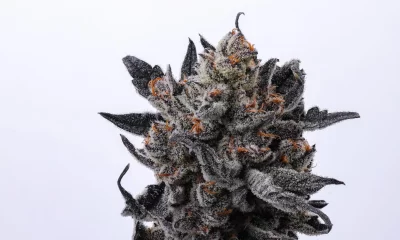Business
Idaho Plans for Medical Cannabis Legalization on the Ballot in 2024

After 10 years of failed ballot initiatives, a newly announced initiative to legalize medical cannabis in Idaho will soon be underway.
A non-profit organization called Kind Idaho, which was originally founded in 2021, recently announced that it would be pushing for an initiative to legalize medical cannabis in 2024.
Kind Idaho has between now and April 2024 to collect enough signatures (at least 74,000) to qualify its Idaho Medical Marijuana Act for the ballot. According to Kind Idaho Treasurer Joe Evans, advocates are ready to make medical cannabis legalization a reality. “One of the things that we’re looking at is making sure that those are available and legal, without necessarily presenting the opportunity for abuse,” Evans told KTVB7. “So it’s a combination of education on what the potential uses are, and responsible use.”
Idaho is one of 12 states that have not yet legalized medical cannabis. Evans cites the success and safety of medical cannabis as a treatment option in comparison to opioids. “When it comes to patient advocacy seeing medical marijuana, which is a successful, nonlethal pain management program that is nearly impossible to overdose on, is one of those options that many are looking for simply because they don’t want to have to carry around the significant number of prescriptions, pain management, oxycodone, you know, opiates,” Evans said.
More importantly, Evans points out that legal access is paramount. “We want the opportunity for Idaho residents to succeed on their own terms. And for many of those people on their own terms, the best solution is medical marijuana,” Evans stated.
Starting Dec. 1, Kind Idaho will start attending events to promote education about medical cannabis, bolster a social media presence, and begin the signature collecting process.
A recent poll from the Idaho Statesman shows that 68% of residents show support for medical cannabis legalization. However, advocates in Idaho have been attempting to make medical cannabis legalization a reality for the past 10 years without success.
The state saw its first official ballot initiative for medical cannabis in 2012, but it failed to get enough signatures to make it onto the ballot. In 2013, the Idaho legislature passed a resolution against cannabis in any form. That same year, advocates began collecting signatures for the 2014 ballot, but they were unable to collect enough signatures. New Approach Idaho collected signatures in 2015 which would have established a medical cannabis program and decriminalize small amounts, but the following year it withdrew the petition due to wording issues. Later in 2016, another ballot initiative surfaced. Even this year, a legalization effort began but was cut short due to lack of signatures.
Idaho Gov. Brad Little did sign House Bill 1265 in April 2021, which made Idaho the 50th state to legalize industrial hemp. In September 2022, the Idaho Department of Agriculture announced that hemp and CBD products are not recognized by the U.S. Food and Drug Administration, and therefore not allowed to be sold legally as feed for animals. “As such, these products are not approved feed ingredients and cannot lawfully be added to or incorporated into commercial feed. This includes feeds, treats and remedies intended for pets, livestock, or any other animal,” the Idaho Department of Agriculture said. This restriction took effect on Nov. 1.
Organizations such as the National Animal Group have spoken up about the restriction, urging legislators to lift the ban. “This decision will likely harm animals whose owners will no longer be able to access the products their pets rely on for a variety of health and wellness reasons,” stated a Change.org petition. “It will also have a serious economic impact on Idaho businesses that manufacture and sell these products.”
Source: https://hightimes.com/news/idaho-plans-for-medical-cannabis-legalization-on-the-ballot-in-2024/
Business
New Mexico cannabis operator fined, loses license for alleged BioTrack fraud

New Mexico regulators fined a cannabis operator nearly $300,000 and revoked its license after the company allegedly created fake reports in the state’s traceability software.
The New Mexico Cannabis Control Division (CCD) accused marijuana manufacturer and retailer Golden Roots of 11 violations, according to Albuquerque Business First.
Golden Roots operates the The Cannabis Revolution Dispensary.
The majority of the violations are related to the Albuquerque company’s improper use of BioTrack, which has been New Mexico’s track-and-trace vendor since 2015.
The CCD alleges Golden Roots reported marijuana production only two months after it had received its vertically integrated license, according to Albuquerque Business First.
Because cannabis takes longer than two months to be cultivated, the CCD was suspicious of the report.
After inspecting the company’s premises, the CCD alleged Golden Roots reported cultivation, transportation and sales in BioTrack but wasn’t able to provide officers who inspected the site evidence that the operator was cultivating cannabis.
In April, the CCD revoked Golden Roots’ license and issued a $10,000 fine, according to the news outlet.
The company requested a hearing, which the regulator scheduled for Sept. 1.
At the hearing, the CCD testified that the company’s dried-cannabis weights in BioTrack were suspicious because they didn’t seem to accurately reflect how much weight marijuana loses as it dries.
Company employees also poorly accounted for why they were making adjustments in the system of up to 24 pounds of cannabis, making comments such as “bad” or “mistake” in the software, Albuquerque Business First reported.
Golden Roots was fined $298,972.05 – the amount regulators allege the company made selling products that weren’t properly accounted for in BioTrack.
The CCD has been cracking down on cannabis operators accused of selling products procured from out-of-state or not grown legally:
- Regulators alleged in August that Albuquerque dispensary Sawmill Sweet Leaf sold out-of-state products and didn’t have a license for extraction.
- Paradise Exotics Distro lost its license in July after regulators alleged the company sold products made in California.
Golden Roots was the first alleged rulebreaker in New Mexico to be asked to pay a large fine.
Source: https://mjbizdaily.com/new-mexico-cannabis-operator-fined-loses-license-for-alleged-biotrack-fraud/
Business
Marijuana companies suing US attorney general in federal prohibition challenge

Four marijuana companies, including a multistate operator, have filed a lawsuit against U.S. Attorney General Merrick Garland in which they allege the federal MJ prohibition under the Controlled Substances Act is no longer constitutional.
According to the complaint, filed Thursday in U.S. District Court in Massachusetts, retailer Canna Provisions, Treevit delivery service CEO Gyasi Sellers, cultivator Wiseacre Farm and MSO Verano Holdings Corp. are all harmed by “the federal government’s unconstitutional ban on cultivating, manufacturing, distributing, or possessing intrastate marijuana.”
Verano is headquartered in Chicago but has operations in Massachusetts; the other three operators are based in Massachusetts.
The lawsuit seeks a ruling that the “Controlled Substances Act is unconstitutional as applied to the intrastate cultivation, manufacture, possession, and distribution of marijuana pursuant to state law.”
The companies want the case to go before the U.S. Supreme Court.
They hired prominent law firm Boies Schiller Flexner to represent them.
The New York-based firm’s principal is David Boies, whose former clients include Microsoft, former presidential candidate Al Gore and Elizabeth Holmes’ disgraced startup Theranos.
Similar challenges to the federal Controlled Substances Act (CSA) have failed.
One such challenge led to a landmark Supreme Court decision in 2005.
In Gonzalez vs. Raich, the highest court in the United States ruled in a 6-3 decision that the commerce clause of the U.S. Constitution gave Congress the power to outlaw marijuana federally, even though state laws allow the cultivation and sale of cannabis.
In the 18 years since that ruling, 23 states and the District of Columbia have legalized adult-use marijuana and the federal government has allowed a multibillion-dollar cannabis industry to thrive.
Since both Congress and the U.S. Department of Justice, currently headed by Garland, have declined to intervene in state-licensed marijuana markets, the key facts that led to the Supreme Court’s 2005 ruling “no longer apply,” Boies said in a statement Thursday.
“The Supreme Court has since made clear that the federal government lacks the authority to regulate purely intrastate commerce,” Boies said.
“Moreover, the facts on which those precedents are based are no longer true.”
Verano President Darren Weiss said in a statement the company is “prepared to bring this case all the way to the Supreme Court in order to align federal law with how Congress has acted for years.”
While the Biden administration’s push to reschedule marijuana would help solve marijuana operators’ federal tax woes, neither rescheduling nor modest Congressional reforms such as the SAFER Banking Act “solve the fundamental issue,” Weiss added.
“The application of the CSA to lawful state-run cannabis business is an unconstitutional overreach on state sovereignty that has led to decades of harm, failed businesses, lost jobs, and unsafe working conditions.”
Business
Alabama to make another attempt Dec. 1 to award medical cannabis licenses

Alabama regulators are targeting Dec. 1 to award the first batch of medical cannabis business licenses after the agency’s first two attempts were scrapped because of scoring errors and litigation.
The first licenses will be awarded to individual cultivators, delivery providers, processors, dispensaries and state testing labs, according to the Alabama Medical Cannabis Commission (AMCC).
Then, on Dec. 12, the AMCC will award licenses for vertically integrated operations, a designation set primarily for multistate operators.
Licenses are expected to be handed out 28 days after they have been awarded, so MMJ production could begin in early January, according to the Alabama Daily News.
That means MMJ products could be available for patients around early March, an AMCC spokesperson told the media outlet.
Regulators initially awarded 21 business licenses in June, only to void them after applicants alleged inconsistencies with how the applications were scored.
Then, in August, the state awarded 24 different licenses – 19 went to June recipients – only to reverse themselves again and scratch those licenses after spurned applicants filed lawsuits.
A state judge dismissed a lawsuit filed by Chicago-based MSO Verano Holdings Corp., but another lawsuit is pending.
Source: https://mjbizdaily.com/alabama-plans-to-award-medical-cannabis-licenses-dec-1/
-

 Business2 years ago
Business2 years agoPot Odor Does Not Justify Probable Cause for Vehicle Searches, Minnesota Court Affirms
-

 Business2 years ago
Business2 years agoNew Mexico cannabis operator fined, loses license for alleged BioTrack fraud
-

 Business2 years ago
Business2 years agoAlabama to make another attempt Dec. 1 to award medical cannabis licenses
-

 Business2 years ago
Business2 years agoWashington State Pays Out $9.4 Million in Refunds Relating to Drug Convictions
-

 Business2 years ago
Business2 years agoMarijuana companies suing US attorney general in federal prohibition challenge
-

 Business2 years ago
Business2 years agoLegal Marijuana Handed A Nothing Burger From NY State
-

 Business2 years ago
Business2 years agoCan Cannabis Help Seasonal Depression
-

 Blogs2 years ago
Blogs2 years agoCannabis Art Is Flourishing On Etsy













